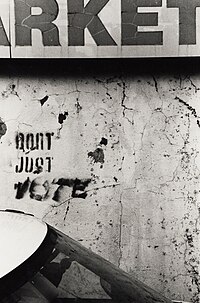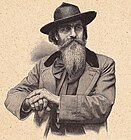Portal:Anarchism
Selected Anarchism-related content Anarchism is a political philosophy and movement that is against all forms of authority and seeks to abolish the institutions it claims maintain unnecessary coercion and hierarchy, typically including the state and capitalism. Anarchism advocates for the replacement of the state with stateless societies and voluntary free associations. A historically left-wing movement, anarchism is usually described as the libertarian wing of the socialist movement (libertarian socialism). Although traces of anarchist ideas are found all throughout history, modern anarchism emerged from the Enlightenment. During the latter half of the 19th and the first decades of the 20th century, the anarchist movement flourished in most parts of the world and had a significant role in workers' struggles for emancipation. Various anarchist schools of thought formed during this period. Anarchists have taken part in several revolutions, most notably in the Paris Commune, the Russian Civil War and the Spanish Civil War, whose end marked the end of the classical era of anarchism. In the last decades of the 20th and into the 21st century, the anarchist movement has been resurgent once more, growing in popularity and influence within anti-capitalist, anti-war and anti-globalisation movements. (Full article...)
Selected article
Philip K. Dick, "The Last of the Masters"
"The Last of the Masters" depicts a society 200 years after a global anarchist revolution has toppled the national governments of the world (the exact year is unstated). Civilization has stagnated due to the loss of scientific knowledge and industry during the now-legendary revolt. Elsewhere, the last state, governing a highly centralized and efficient society, conceals itself from the Anarchist League, a global militia preventing the recreation of any government. When three agents of the League are sent to investigate rumors of the microstate's existence, the government arranges for them to be killed, leading to the death of one and the capture of another. Tensions rapidly escalate after the agents of the state realize that the third has escaped. Assuming he will report the state's existence, the government mobilizes for total war. In actuality, the surviving anarchist elects to attempt his comrades' rescue and assassinate the head of state: the last surviving "government robot". The primary theme of the story is the conflict between anarchism and statism, the political and ethical dimensions of which are explored through the characters' dialogue. Though the attention the story received was limited prior to the author's death in 1982, it has since seen greater circulation in Philip K. Dick story collections, and has been reviewed and analyzed for its postmodern critique of technology and its political implications. (read more...)References
Selected image Stenciled graffito in Washington D.C. bearing the slogan of CrimethInc.'s 2004 Don't Just Vote campaign, which exhorted voters to expand their political advocacy beyond voting to direct action. Image courtesy of the Brian MacKenzie Infoshop. CrimethInc. argued that "[v]oting for people to represent your interests is the least efficient and effective means of applying political power. The alternative, broadly speaking, is acting directly to represent your interests yourself." This posture is typical of anarchism's historical anti-electoralism. Did you know?
Selected quoteAnniversaries for December 22
Relevant listsCategoriesRelated portalsParent portals Socio-political portals Related WikiProjectsParent projects
Economics · Philosophy Socio-political projects Anarchism TopicsThings you can doThank you for your interest in improving the coverage of anarchism on Wikipedia!
Related WikimediaThe following Wikimedia Foundation sister projects provide more on this subject:
Discover Wikipedia using portals |























